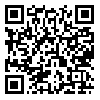Volume 19, Issue 60 (4-2025)
MLJ 2025, 19(60): 102-112 |
Back to browse issues page
Download citation:
BibTeX | RIS | EndNote | Medlars | ProCite | Reference Manager | RefWorks
Send citation to:



BibTeX | RIS | EndNote | Medlars | ProCite | Reference Manager | RefWorks
Send citation to:
Fallah Ketilateh N, Abbasi M, Ghorbani Gatab O. Civil Liability Arising from Violation of Patients' Right to Privacy due to the Use of Artificial Intelligence Systems in Healthcare Environments. MLJ 2025; 19 (60) :102-112
URL: http://ijmedicallaw.ir/article-1-1837-en.html
URL: http://ijmedicallaw.ir/article-1-1837-en.html
1- Department of Private Law, Tehren-e- Shargh Branch, Islamic Azad University, Tehran, Iran
2- Department of Private Law, Qaemshahr Branch, Islamic Azad University, Mazandran, Iran
2- Department of Private Law, Qaemshahr Branch, Islamic Azad University, Mazandran, Iran
Abstract:
Background and Aim: Artificial intelligence has various applications in hospital environments, ranging from management to medical and nursing services. This large volume of use of artificial intelligence in hospitals, despite having brought with it many positive effects, has also had negative effects, which raises the issue of their civil liability. In this context, there are two types of discussions: first, whether the type of civil liability arising from the violation of patients' privacy by artificial intelligence in medical environments should be civil liability based on fault or absolute or pure civil liability?; Second, to whom can civil liability be attributed in the context of the violation of patients' privacy by artificial intelligence in medical environments? Should the developer of those systems be considered civilly liable or should the medical staff or hospital management or even the artificial intelligence itself? The objectives pursued in this research are: To identify the type of liability arising from the violation of patients' privacy rights by artificial intelligence in medical environments on the one hand and to identify the possibility of attributing damages in this context.
Method: The present research method is descriptive-analytical. In this regard, reliable library sources are used, including primary sources, i.e. laws and regulations that exist in both the field of artificial intelligence and the field of patient privacy and secondary sources, i.e. books, articles and related viewpoints.
Ethical Considerations: This research has been prepared in accordance with the principles of trustworthiness, honesty, avoiding plagiarism and accuracy.
Results: In the Iranian legal system, civil liability arising from violations of patient privacy by AI systems is subject to the general system of civil liability based on fault, due to the lack of legislation in the field of AI. Therefore, compensation for damages resulting from violations of patient privacy by AI systems can only be sought if the fault of these systems is established.
Conclusion: The results of the present study are that, first, the impact of artificial intelligence on patient privacy can be divided into two categories: Positive and negative: From a positive perspective, since access to data in artificial intelligence systems is rapid, the level of access to patient data in these systems is higher than that of human users. However, from a negative perspective, since artificial intelligence systems are the main center for accumulating patient data, any information leakage from these systems could lead to a major violation of patient privacy; Secondly, due to the large number of artificial intelligence systems in the medical field and the necessity of including patients' personal data in them due to the lack of regulation of these systems, centers should be established to monitor patient privacy in these systems.
Please cite this article as:
Fallah Ketilateh N, Abbasi M, Ghorbani Gatab O. Civil Liability Arising from Violation of Patients' Right to Privacy due to the Use of Artificial Intelligence Systems in Healthcare Environments. Medical Law Journal. 2025; 19: e8.
Method: The present research method is descriptive-analytical. In this regard, reliable library sources are used, including primary sources, i.e. laws and regulations that exist in both the field of artificial intelligence and the field of patient privacy and secondary sources, i.e. books, articles and related viewpoints.
Ethical Considerations: This research has been prepared in accordance with the principles of trustworthiness, honesty, avoiding plagiarism and accuracy.
Results: In the Iranian legal system, civil liability arising from violations of patient privacy by AI systems is subject to the general system of civil liability based on fault, due to the lack of legislation in the field of AI. Therefore, compensation for damages resulting from violations of patient privacy by AI systems can only be sought if the fault of these systems is established.
Conclusion: The results of the present study are that, first, the impact of artificial intelligence on patient privacy can be divided into two categories: Positive and negative: From a positive perspective, since access to data in artificial intelligence systems is rapid, the level of access to patient data in these systems is higher than that of human users. However, from a negative perspective, since artificial intelligence systems are the main center for accumulating patient data, any information leakage from these systems could lead to a major violation of patient privacy; Secondly, due to the large number of artificial intelligence systems in the medical field and the necessity of including patients' personal data in them due to the lack of regulation of these systems, centers should be established to monitor patient privacy in these systems.
Please cite this article as:
Fallah Ketilateh N, Abbasi M, Ghorbani Gatab O. Civil Liability Arising from Violation of Patients' Right to Privacy due to the Use of Artificial Intelligence Systems in Healthcare Environments. Medical Law Journal. 2025; 19: e8.
Keywords: Civil Liability, Artificial Intelligence, Confidentiality, Patient Privacy, Right to Health
Type of Study: Original Article |
Received: 2024/06/13 | Accepted: 2024/10/20
Received: 2024/06/13 | Accepted: 2024/10/20
Send email to the article author
| Rights and permissions | |
 |
This work is licensed under a Creative Commons Attribution-NonCommercial 4.0 International License. |






